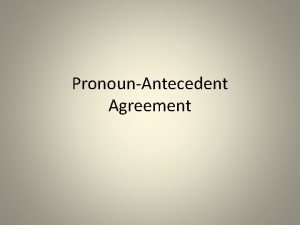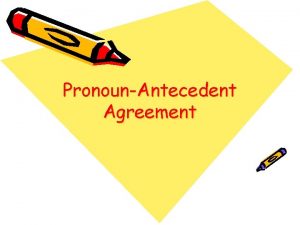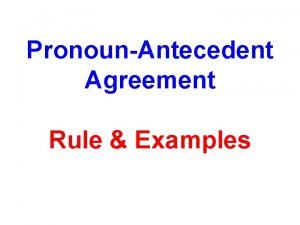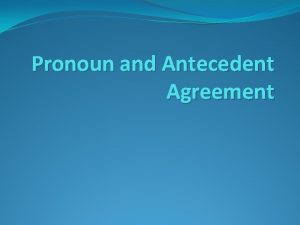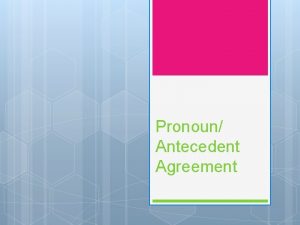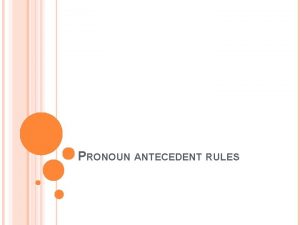Agreement of Pronoun and Antecedent THE NOUN OR









- Slides: 9

Agreement of Pronoun and Antecedent THE NOUN OR PRONOUN THAT A PRONOUN REFERS TO IS CALLED ITS ANTECEDENT

A pronoun should agree in both number and gender with its antecedent �Use singular pronouns to refer to singular antecedents. Use plural pronouns to refer to plural antecedents. �SINGULAR- Richard Strauss composed many operas. Der Rosenkavalier is perhaps his most famous. �PLURAL- The mountain climbers believe that they will reach the summit by Friday.

Some singular pronouns indicate gender (masculine, feminine or neuter) �EXAMPLES: Does Margaret like her dance class? Michael is doing his homework. Because the car wouldn’t start, it had to be towed.

Indefinite Pronouns �INDEFINITE PRONOUNS AGREE WITH THEIR ANTECEDENTS ACCORDING TO THE FOLLOWING RULES. 1. The indefinite pronouns anybody, anyone, anything, each, either, everybody, everyone, everything, neither, nobody, no one, nothing, one, somebody, someone, and something are singular. examples: Each of the teams had its mascot at the game. One of the boys left his pen behind. Everybody in the girls’ league has paid her

�The indefinite pronouns both, few, many, and several are plural. Examples: Both of the candidates clearly stated their positions on the issue. Many of the actors already knew their lines.

�The indefinite pronouns all, any, more, most , none, and some may be singular or plural, depending on how they are used in a sentence. Examples: Most of this money belongs to Ms. Jones. Would you take it to her please? (It is used because most refers to the singular noun money. ) Most of these coins are rare, but I don’t know what they are worth. (They is used because most refers to the plural noun coins. )

Compound Antecedents �Pronouns agree with compound antecedents according to the following rules. 1. Use a plural noun to refer to two or more antecedents joined by and. Example: The guide and the ranger wrapped their rain ponchos in their saddle rolls. 2. Use a singular pronoun to refer to two or more singular antecedents joined by or or nor Example: Neither Heidi nor Beth took her umbrella with her.

Special Problems in Pronoun. Antecedent Agreement �A collective noun is singular when the noun refers to the group as a unit and plural when the noun refers to the individual members or parts of the group. SINGULAR- The orchestra was looking forward to performing its rendition of Beethoven’s symphony. PLURAL- The orchestra were tuning their instruments when the conductor arrived.

� An expression of an amount (a measurement , a percentage, or a fraction, for example) may take a singular or plural pronoun, depending on how it is used. Some nouns that are plural in form take singular pronouns (civics, genetics, mathematics, mumps, news, gymnastics, measles, electronics) Even when plural in form, the title of a creative work (such as a book, song, movie, or painting) or the name of a country, a city, or an organization generally takes a singular pronoun.
 Pronoun-antecedent
Pronoun-antecedent Hisself vs himself
Hisself vs himself Pronoun-antecedent agreement examples
Pronoun-antecedent agreement examples Pronoun antecedent agreement rules
Pronoun antecedent agreement rules Redacted meaning
Redacted meaning Pronoun antecedent agreement
Pronoun antecedent agreement What is the basic principle of pronoun antecedent agreement
What is the basic principle of pronoun antecedent agreement After feeding several quarters into the gumball machine
After feeding several quarters into the gumball machine What is a pronoun
What is a pronoun What is the basic principle of pronoun antecedent agreement
What is the basic principle of pronoun antecedent agreement

